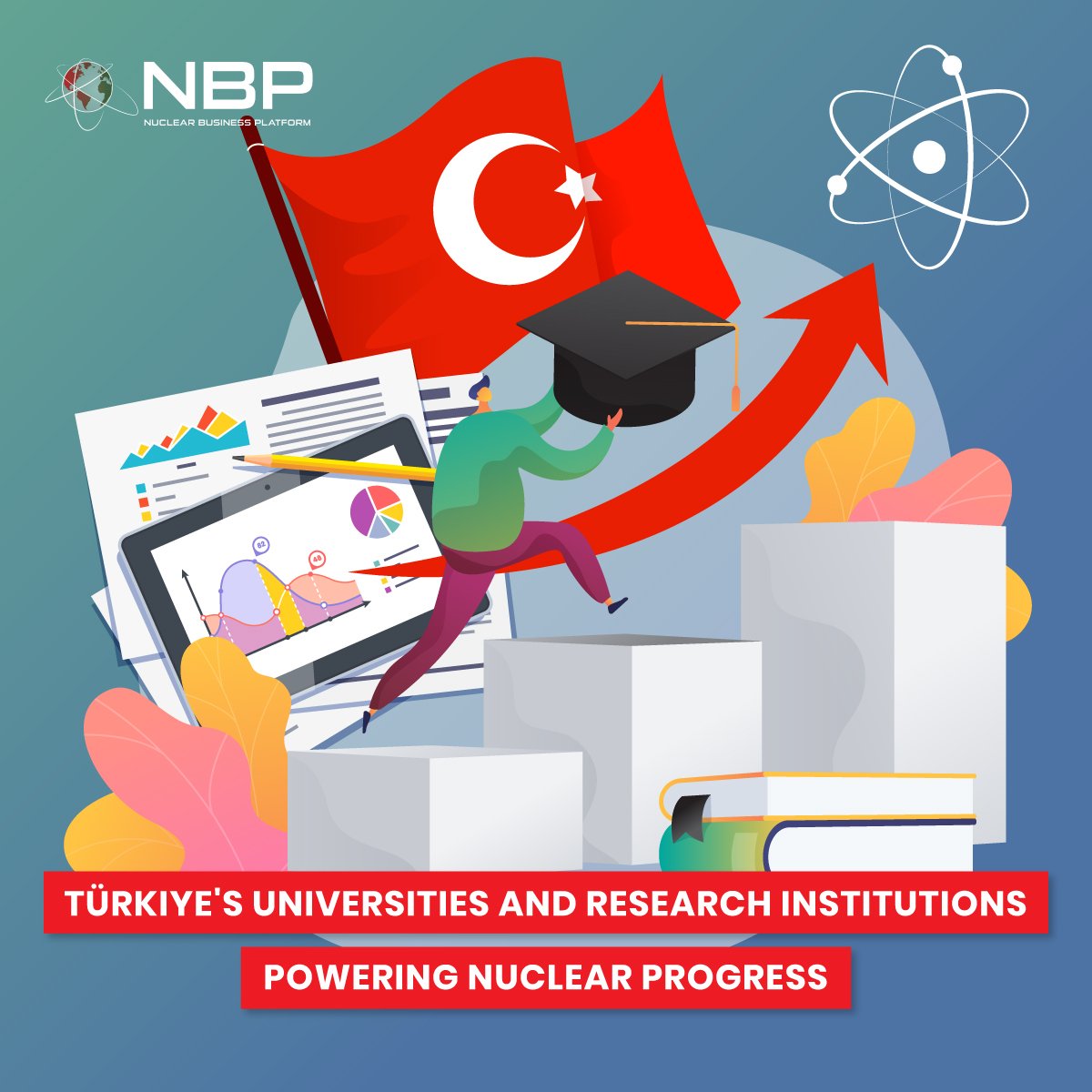Türkiye's Universities and Research Institutions Powering Nuclear Progress
Türkiye’s advancement in nuclear technology is deeply rooted in the efforts of its universities and research institutions, which play a vital role in fostering innovation, developing skilled human resources, and driving scientific collaboration. These institutions not only contribute to the technical progress of nuclear energy but also serve as hubs for international partnerships and knowledge exchange.
Türkiye's goal to achieve 20 GW of nuclear power capacity by 2050 has attracted interest from international nuclear stakeholders. The country's strategy includes a combination of large-scale nuclear power plants and small modular reactors (SMRs), reflecting its intent to secure a diverse energy future. By combining education, research, and global cooperation, Turkish universities and research organizations are instrumental in positioning Türkiye as a key player in the nuclear technology landscape.
Key Institutions and Their Contributions
TENMAK and its Technical Institutions
The Turkish Energy, Nuclear, and Mineral Research Agency (TENMAK) leads nuclear research and development in Türkiye. Its five technical institutes focus on advancing nuclear fuel cycles, reactor technology, and materials critical to nuclear applications:
Nuclear Energy Research Institute (NUKEN): With campuses in Ankara and Istanbul, NUKEN is dedicated to advancing nuclear fuel cycles, radiation science, and reactor technology. It hosts the TR-2 research reactor at the Istanbul campus, which facilitates fundamental research and radioisotope production.
Boron Research Institute (BOREN) and Rare Earth Elements Research Institute (NATEN): These institutes contribute to the advancement of materials critical for nuclear technology and other industrial applications.
Energy Research Institute (ENAREN) and Clean Energy Research Institute (TEMEN): Focused on energy and clean technologies, these institutes support the development of sustainable energy solutions and the improvement of existing technologies.
Leading Universities
Istanbul Technical University (ITU)
Istanbul Technical University (ITU) has been a cornerstone in nuclear engineering education and research since 1961. The university's Nuclear Energy Institute (NEI), now part of the Energy Institute (EI), offers a range of programs in nuclear engineering and radiation science. ITU operates a 250 kW TRIGA-type research reactor, which serves both academic research and educational purposes.Hacettepe University
Hacettepe University, based in Ankara, offers a comprehensive nuclear engineering program in English at both undergraduate and graduate levels. Since its inception in 1982, the program has produced approximately 600 nuclear engineers, many of whom are actively contributing to Türkiye’s nuclear sector. Dr. Sule Ergun, an associate professor of nuclear engineering at Hacettepe University, in the NBP Hot Seat has emphasized that Türkiye's youth are increasingly motivated by jobs that offer positive global impact in addition to job security. She also highlighted the potential for professionals from non-technical backgrounds to contribute to nuclear energy development and suggested that involving the private sector in R&D could further advance these efforts.Sinop University
Sinop University has been advancing nuclear engineering education since 2015. The university’s undergraduate and graduate programs focus on equipping students with the knowledge and skills necessary for careers in nuclear technology. Its graduates are actively involved in both governmental and private sectors.
Human Resources Development
Türkiye has prioritized the development of its nuclear workforce through various initiatives. The country’s collaboration with the International Atomic Energy Agency (IAEA) has facilitated the organization of training courses and workshops. The General Directorate of Nuclear Energy (GDNE) and International Projects under Ministry of Energy and Natural Resources (MENR-NUP) is instrumental in implementing Türkiye’s nuclear power program and coordinating efforts among national authorities, academia, and the private sector.
Key initiatives include:
Scholarship Programs: Every year, the Ministry of National Education selects around 500 Turkish students for scholarships to pursue graduate studies in nuclear fields at universities in the UK, USA, Russia, and Germany. Upon completion of their education, these students are required to work at MENR-GDNE, Nuclear Regulatory Authority (NDK), TENMAK, and Electricity Generation Joint Stock Company (EUAS) for double the duration of their time abroad.
International Collaborations: Türkiye’s agreements with international entities, such as the Russian Federation, enhance the training and development of nuclear engineers. Joint programs with Russian universities offer dual diplomas and practical experience at nuclear power plants.
Internship Agreements: An agreement between the Ministry of Energy and the Ministry of Education facilitates internships for nuclear energy students in leading nuclear research institutions in the UK, USA, Russia, and Germany.
Training Programs: Alongside IAEA's training programs and workshops for the development of human resources in the nuclear industry, TENMAK also provides targeted training for personnel in the nuclear field.
Potential for International Collaboration and Business Partnerships
The contributions of Turkish universities and research institutions position Türkiye as a key player in the global nuclear technology landscape. The country’s active participation in international research networks, such as CERN and SESAME, underscores its commitment to global scientific progress. Türkiye also fosters connections with renowned international nuclear research institutions in Russia, China, Japan, the USA, and the UK.
Future opportunities for international collaboration and business partnerships include:
Joint Research and Development Projects: Collaborative R&D projects with international partners can accelerate the development of new nuclear technologies and enhance existing ones.
Educational Partnerships: Expanding dual-degree programs and training initiatives with global universities can further strengthen Türkiye’s nuclear workforce.
Industry Partnerships: Collaborations with international nuclear technology firms can drive innovation and facilitate the commercialization of new technologies.
Turkish universities and research institutions are making significant contributions to the advancement of nuclear technology. Their role in research, education, and international collaboration is crucial for the continued growth of Türkiye’s nuclear sector. In addition to the Akkuyu Nuclear Power Plant, Türkiye is planning its second nuclear plant at Sinop and a third in the Thrace region, further reinforcing its nuclear ambitions. By leveraging global partnerships and focusing on innovative research, Türkiye is well-positioned to become a leading player in the international nuclear technology arena.



